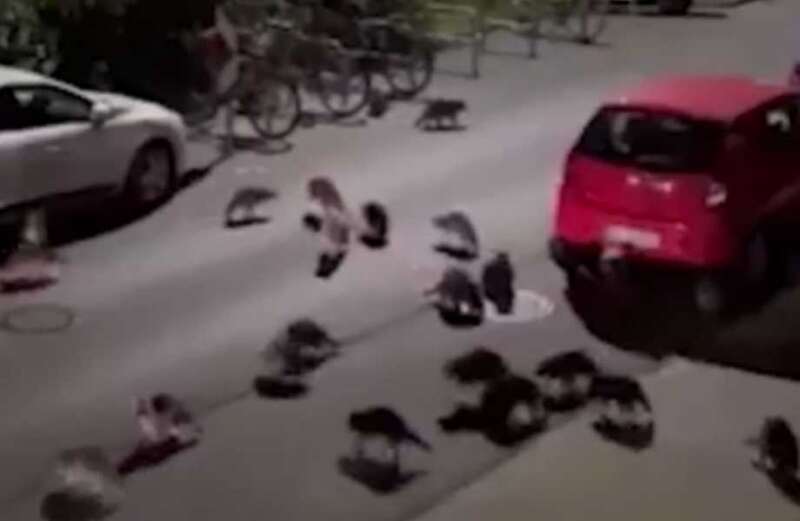A GERMAN city has been turned into the "raccoon capital of Europe" as the Nazi-era pests rampage through homes and raid dustbins.
Shocking footage showed more than a dozen of dumpster-diving nocturnal beasts roaming the streets of Kassel.





A popular theory suggests the wild animals earned the name of "Nazi raccoons" after they were introduced by Hermann Goering - the founder of the Gestapo - in the 1930s.
But forestry officials in Kassel were actually to blame.
On April 12, 1934, Wilhelm Freiherr Sittich von Berlepsch, the head of the local forestry office, released two pairs of raccoons at nearby Lake Edersee to "enrich" the local wildlife.
 Man fined £165 after outraging the internet by dying puppy to look like Pikachu
Man fined £165 after outraging the internet by dying puppy to look like Pikachu
And the so-called "masked bandits" have been causing mayhem ever since - and exploding in numbers.
Native to America, the German city - with a population of 200,000 - has been overrun by an estimated whopping 30,000 raccoons.
And that's 25 times the figure found anywhere else in Germany, The Times reports.
Raccoons in Germany were initially kept in captivity for their fur - but many managed to escape the fur farms during World War Two and others were intentionally released into the wild.
Experts believe the number of raccoons in Germany could soon reach one million.
With cities offering lots of food and shelter, people living in Kassel have long been forced to share their space with the raccoons.
The nocturnal omnivores take over the parks and streets, climb into chimneys, garden sheds or attics, and raid bins and gardens in search of food.
They saunter into homes, brazenly crossing busy streets, and fight off pet cats and dogs.
In some cases, the animals have decimated homes by tearing away insulation and smashing roof tiles.
Raccoons in Germany are also known as "washing bears" due to their ability to wash food in water before eating it.
 Dog who 'always melts hearts' with his smile hopes to find a loving family
Dog who 'always melts hearts' with his smile hopes to find a loving family
They mostly munch on birds and amphibians - including the yellow-bellied toad which is already highly endangered - and leave trails of scattered debris from their hunts.
They are a pest. I’ve seen attics that have been completely ruined by raccoons
Frank Becker
But the creatures have also reportedly become the city's unofficial mascot - with shops selling furry toys, T-shirts and magnets.
Researchers have found the troublesome raccoons to be intelligent - even learning how to open secure bins.
Others believe the threat of the rampaging raccoons - who have no natural predators - has been exaggerated.
Berit Michler, a leading raccoon biologist, told BBC Wildlife: "Raccoons are lazy.
"They mainly eat what is easy to obtain, which is usually prey species that are abundant and readily available."
Last year, a total of 200,000 raccoons were culled in Germany - with pest control firms catch them in live traps before killing them.
After the introduction of the species, hunting was initially restricted but it was implemented in 1954 in Hesse when the raccoons started raiding chicken coops and crops.
Culling is now legal in all German states.
Frank Becker, a raccoon hunter, said: "They are a pest. I’ve seen attics that have been completely ruined by raccoons.
"The costs of the damage can be as much as €10,000. I’ve seen one house that had to be demolished entirely."
Raccoons are lazy. They mainly eat what is easy to obtain, which is usually prey species that are abundant and readily available
Berit Michler
Several organisations, including PETA, have called for a halt on culling.
Some people keep the creatures as pets and animal shelters will look after injured cubs before releasing them back in the wild.
Beyond Germany, the animals have spread into neighbouring nations - with Belgium, France, the Netherlands, and Italy facing increasing raccoon populations.
Some have raised concerns about the invaders' potential impact on native flora and fauna.
And the EU added the common raccoon to its invasive species list in 2016.
Experts believe culling the raccoons doesn't fix the problem and new ones arrive immediately.
It might be that the only option left is for people and raccoons to find a way to live together.




































